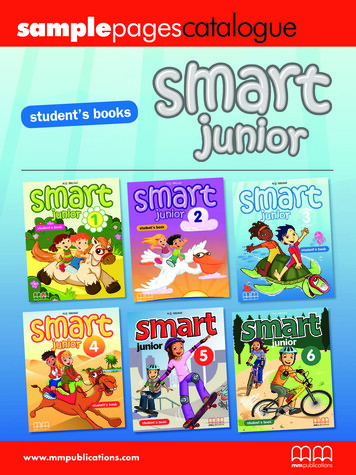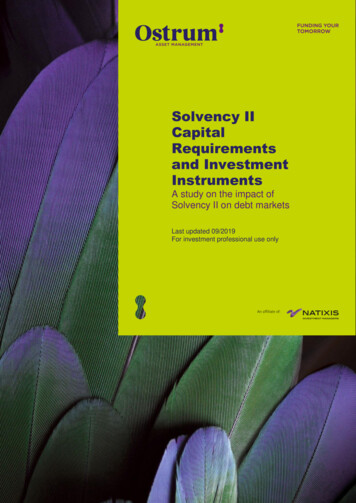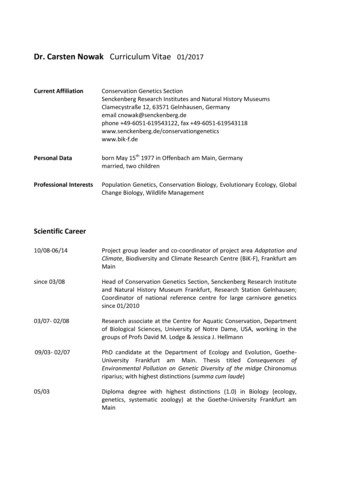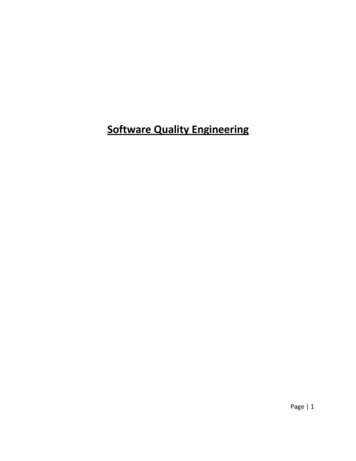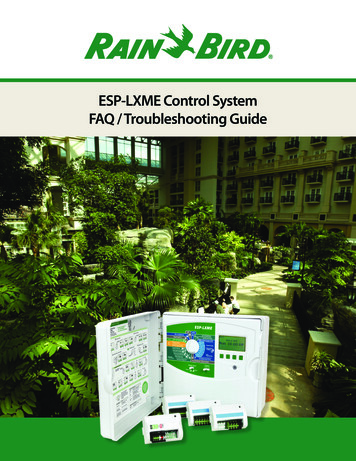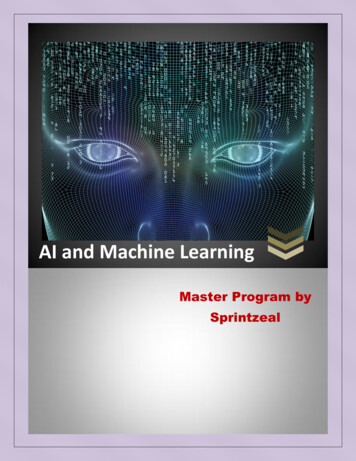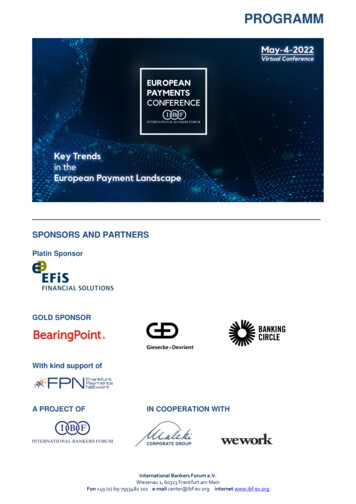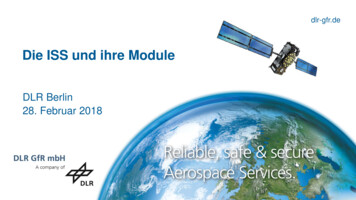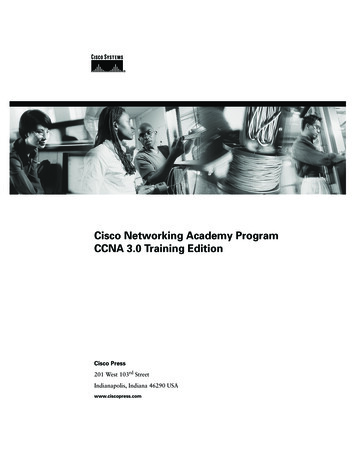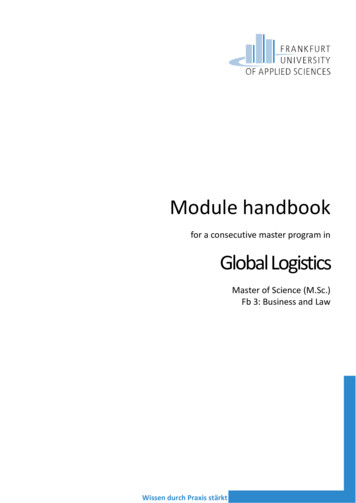
Transcription
Module handbookfor a consecutive master program inGlobal LogisticsMaster of Science (M.Sc.)Fb 3: Business and LawWissendurchWissen durch Praxis stärktPr
Page 2/38Module handbook for the master program in Global Logistics (M.Sc.)Table of contents1. Qualification goals .32. Module overview of degree program.43. ECTS-/Workload overview .54. Module description .6Module 1: Selected Topics in Corporate Logistics .6Module 2: Hub Logistics and Transport Logistics .8Module 3: Selected Topics in Logistics and Economics .11Module 4: IT based Process Management with ERP-Systems.13Module 5: International Trade and International Business Law .15Module 6: Empirical and Quantitative Methods .18Module 7: Supply Chain Management .21Module 8: Research Project in Applied Logistics and Economics .23Module 9: IT-Technology in Logistics .25Module 10: General Framework in Transport Economics .28Module 11: Change Management .31Module 12: Simulation in Logistics .33Module 13: Master Thesis with Colloquium .35Module 14: Praxis-Transfer-Project.36FBR-Beschluss vom 19.12.2018Frankfurt University of Applied Sciences - FB 3: Business and Law
Page 3/38Module handbook for the master program in Global Logistics (M.Sc.)1. Qualification objectivesGraduates of the Master's degree program in Global Logistics (M.Sc.) are qualified to pursue a professional careerin nationally and internationally operating logistics companies and respective departments in all industries as wellas corresponding associations and organizations or to pursue a doctorate.They are able to identify current logistical challenges within the area of global trade and facing individualcompanies and have in-depth technical and methodological competence in the fields of logistics and transporteconomics.Graduates are able to independently identify, analyze and develop solutions to complex issues and problems invarious logistical sub-areas, particularly using the quantitative methodological skills in the areas of planning,coordination, scheduling and production, as well as in purchasing or distribution, and to develop practicalsolutions suitable for the real world. Using the reflection and judgement skills acquired in the program, they caninterpret relevant findings and derive well-founded recommendations for action.They are able to independently develop scientific questions based on the current state of research, deriveresearch approaches, and to process and document them using scientific procedures and methods. Graduates canpresent their own research results and complex topics to members of both the business community and scientificcommunity in a manner appropriate to the respective target group and exchange information with them in amanner relevant to the field. Even in new and unfamiliar situations they will be able to use their technicalknowledge and IT skills to critically evaluate and weigh information and to draw practical conclusions that taketransport economics, business and social aspects into account.Through application-oriented logistical project work, graduates have learned to structure, manage, lead and takeresponsibility in cooperation with others. They are able to reflect on their own role in the team, assume that roleand drive decision-making processes forward. This enables them to apply their practical and scientific knowledgeindependently and in a manner appropriate to the situation. Graduates can plan and carry out projectsmethodically supported at management level independently and act as consultants, project managers orexecutives.These are important building blocks of their professional and personal development as well as their ownentrepreneurial, social and ethical responsibility.FBR-Beschluss vom 19.12.2018Frankfurt University of Applied Sciences - FB 3: Business and Law
Page 4/38Module handbook for the master program in Global Logistics (M.Sc.)2. Module overview of degree programGlobal Logistics (M.Sc.)Module overviewSemester 3Semester 2Semester 1Stand: 19.12.201812Simulation inLogistics5 CP7Supply ChainManagement5 CP1Selected Topics inCorporate Logistics5 CP13Master Thesis with Colloquium25 CP8Research Project inApplied Logistics and Economics10 CP2Hub Logisticsand TransportLogistics5 CP3SelectedTopics inLogistics andEconomics5 CP9IT-Technologyin Logistics5 CPECTS Points(CP)3010GeneralFramework inTransportEconomics5 CP45IT based Process International TradeManagement with and InternationalERP-SystemsBusiness Law5 CP5 CP11ChangeManagement5 CP306Empirical andQuantitativeMethods5 CP30FBR-Beschluss vom 19.12.2018Frankfurt University of Applied Sciences - FB 3: Business and Law
Page 5/38Module handbook for the master program in Global Logistics (M.Sc.)3. ECTS-/Workload overviewNo.12345678Module TitleSelected Topics inCorporate LogisticsHub Logistics andTransport LogisticsSelected Topics inLogistics and EconomicsIT-based Process Managementwith ERP-SystemsInternational Trade andInternational Business LawEmpirical and QuantitativeMethodsSupply Chain ManagementResearch Project in AppliedLogistics and EconomicsECTS Gewich- Duration[Sem.][CP]tungExamination TypeLanguageEnglish57/1201Project report (submission period 8 weeks)with group presentation (30 to 45 min. perperson, 180 min. max. for the wholepresentation)57/1201Written examination (120 min.)English57/1201Project report (submission period 8 weeks)with presentation (15 to 30 min.)English1Project report (submission period 12 weeks)with presentation (15 to 30 min.); Grading:passed/not passedEnglish557/1201Written examination (120 min.)English57/1201Written examination (120 min.)English57/1201Written examination (120 min.)English1014/1201Project report (submission period 8 weeks)with presentation (15 to 30 min.)EnglishPartial examination 1:Written examination (60 min.) with aweighting of 50 %9IT-Technology in Logistics57/1201Partial examination 2:EnglishProject report (submission period 8 weeks)with group presentation (15 to 30 min. perperson; 120 min. max. for the wholepresentation) with a weighting of 50 %10General Framework inTransport Economics57/1201Written examination (120 min.)English11Change Management57/1201Project report (submission period 6 weeks)with presentation (15 to 30 min.)English12Simulation in Logistics57/1201Project report (submission period 8 weeks)with presentation (15 to 30 min.)English13Master Thesis with Colloquium2536/12020 weeksMaster Thesis (submission period 20 weeks)with Colloquium (30 to 45 min.)English14Praxis-Transfer-Project301Project report (submission period 20 weeks)with presentation (30 to 45 min.)EnglishFBR-Beschluss vom 19.12.2018Frankfurt University of Applied Sciences - FB 3: Business and Law
Page 6/38Module handbook for the master program in Global Logistics (M.Sc.)4. Module descriptionModule 1: Selected Topics in Corporate LogisticsModule titleSelected Topics in Corporate LogisticsModule number1Module code30xx1401Study programGlobal Logistics (M.Sc.)Module usabilityModule duration1 SemesterRecommended semester1st SemesterModule typeCompulsory moduleECTS-Credits (CP) / Workload (h)5 / 150Recommended previous knowledgeNoneModule prerequisitesNoneModule examination requirementsNoneModule examinationProject report (submission period 8 weeks) and group presentation (30 to 45 min. perperson, max. 180 min. for the group)Learning outcomes and skillsStudents are able to illustrate and constitute procurement strategies as well as conceptsof procurement logistics and basic principles of production-synchronous procurement atthe same time of production. They are also able to execute determination applymethods of material requirements planning.Students can recognize as well as evaluate contrary the requirements of logistics andproduction. In particular, the students develop an understanding for the needs ofproduction and how to implement those.Students understand value chain based organizational structures of companies and theircorresponding logistical requirements (network structure, flow principles) and maydescribe logistical structures and contents.The participants analyse and describe logistic-related trends and strategies for the mainindustries plus the consequences on the (inter-) national logistics.Students enhance and deepen their knowledge along the value stream chain ofcompanies and their logistical competencies while deepening their knowledge of thelogistical function in the context of the procurement, production, distribution andremoval.The students can describe and execute the methods of production planning and controlas well as quality management. Students are capable of explain coherencies of outboundlogistics planning (especially transport planning) and to overview operating figures of theoutbound logistics.Through application-oriented logistical project work graduates have learned to structure,manage, lead and take responsibility in cooperation with others. They are able to reflecton their own role in the team, assume that role and drive decision-making processesforward.Module contentsSelected Topics in Corporate LogisticsModule teaching methodsSeminarModule languageEnglishModule availabilityEach winter semesterModule coordinationProf. Dr. Kirstin ZimmerCommentsNoneFBR-Beschluss vom 19.12.2018Frankfurt University of Applied Sciences - FB 3: Business and Law
Page 7/38Module handbook for the master program in Global Logistics (M.Sc.)Unit description of Module 1: Selected Topics in Corporate LogisticsUnit titleSelected Topics in Corporate LogisticsCode30xx14011Module titleSelected Topics in Corporate LogisticsUnit contentsProcurement Management Procurement ConceptsMaterial Requirements PlanningEconomic Order Quantity ModelOperational Procurement ProcessesMaterial Supply ConceptsE-ProcurementDistribution Distribution StructureWarehouse structuresWarehouse technologyLocation PlanningVehicle RoutingSpecial Trade Logistics ConceptsDemand PlanningReverse Logistics Legal RequirementsLogistical PrinciplesTeaching methodsSeminarSemester periods (hours) per week4 SWSWorkload (h)150Class hours (h)60Total time of examination incl. preparation (h)22Total time of individual study (h)60 (including supervision of lecturer)Total time of practical training (h)8Unit languageEnglishLecturerProf. Dr. Kirstin Zimmer and all other logistic professorsRecommended readingChopra, S., Meindl, P.: Supply Chain Management: Strategy, Planning, and Operation,PearsonGrant, D.B.: Logistics Management, PearsonHandfield et al.: Sourcing and Supply Management, PearsonMangan, J., Lalwani C., Butcher T.: Global Logistics and Supply Chain Management,WileyCurrent editionsAssessment type and formAssessment gradingDifferentiated grading according to the general regulations for the bachelor and masterdegrees of the Frankfurt UASCommentsThe seminar will partly take place at the House of Logistics and Mobility.The seminar will be organized in group wise tasks which are organized in cooperationwith companies. The presentations have to be attended by the entire class.FBR-Beschluss vom 19.12.2018Frankfurt University of Applied Sciences - FB 3: Business and Law
Page 8/38Module handbook for the master program in Global Logistics (M.Sc.)Module 2: Hub Logistics and Transport LogisticsModule titleHub Logistics and Transport LogisticsModule number2Module code30xx1402Study programGlobal Logistics (M.Sc.)Module usabilityModule duration1 SemesterRecommended semester1st SemesterModule typeCompulsory moduleECTS-Credits (CP) / Workload (h)5 / 150Recommended previous knowledgeNoneModule prerequisitesNoneModule examination requirementsNoneModule examinationWritten examination (120 min.)Learning outcomes and skillsParticipating students will be able to achieve fundamental competencies in Hub andTransport Logistics. Students will be able to analyze systematically, evaluate and solvecomplex situations while planning or operating logistical ports using applicable methods.Expanding and deepening theoretical knowledge while implementing practical tests withlogistical problems the students will train their social skills and organization methodduring the group work. This is done by performing case studies as well as workshopswith companies.With the aid of decision support systems to develop solutions, students can not onlydiscuss alternative solutions but also evaluate those.Working out case studies in common strengthens social skills of the students. Improvingcooperation and communication skills and training their conflict ability.Module contentsSelected content of Hub LogisticsTransport LogisticsModule teaching methodsSeminarModule languageEnglishModule availabilityEach winter semesterModule coordinationProf. Dr. Susanne KochCommentsThe seminar will partly take place at the HOLM (House of Logistics and Mobility).Excursions and external experts support the learning outcome.FBR-Beschluss vom 19.12.2018Frankfurt University of Applied Sciences - FB 3: Business and Law
Page 9/38Module handbook for the master program in Global Logistics (M.Sc.)Unit description of Module 2: Hub Logistics and Transport LogisticsUnit titleSelected content of Hub LogisticsCode30xx14021Module titleHub Logistics and Transport LogisticsContent of unitThe focus of this unit is the area of hubs (e.g. airports, transshipment facilities,terminals, ports) from the company’s point of view. Besides material and informationflows there also will be discussed processes regarding aspects like layouts, companystrategies, resource and planning issues. In addition, the management of handlingagents (product/program planning, resource and personnel planning, cost accountingand controlling) and possible applications of information and communicationtechnologies (tracking and tracing, data collection and evaluation) are covered.Teaching methodsSeminarSWS of Unit2 SWSTotal workload75 hAttendance Time30 hPart of exam time incl. exam preparation15 hIndependent study30 hPractical time0hLanguage of the module of UnitEnglishLecturersProf. Dr. Susanne Koch, other logistic professors or assistant lecturersLiteratureChristopher, M.: Logistics & Supply Chain Management, PearsonGoldsby, T.: Definitive Guide to Transportation, Principles, Strategies, and Decisions forthe Effective Flow of Goods and Services, PearsonCurrent editionsType of performance record of UnitEvaluation of performance record of UnitDifferentiated grading according to the general regulations for the bachelor and masterdegrees of the Frankfurt UASFurther informationNoneFBR-Beschluss vom 19.12.2018Frankfurt University of Applied Sciences - FB 3: Business and Law
Page 10/38Module handbook for the master program in Global Logistics (M.Sc.)Unit description of Module 2: Hub Logistics and Transport LogisticsUnit titleTransport LogisticsCodeModule titleHub Logistics and Transport LogisticsUnit contentsCore Areas of transport Logistics Infrastructure, Technologies, Services, Information andCommunication Technologies in traffic, port and airport Development of the Transport Industry, Basic Knowledge of the Traffic Industry, Transport Mode, Transport Infrastructure, Transport Vehicle, Legal Fundaments, Transport Markets, Service Creation and Traffic Service, Public TransportTeaching methodsSeminarSemester periods (hours) per week2 SWSWorkload (h)75Class hours (h)30Total time of examination incl. preparation (h)15Total time of individual study (h)30Total time of practical training (h)0Unit languageEnglishLecturerProf. Dr. Susanne Koch, other logistic professors or assistant lecturersRecommended readingChristopher, M.: Logistics & Supply Chain Management, PearsonGoldsby, T.: Definitive Guide to Transportation, Principles, Strategies, and Decisions forthe Effective Flow of Goods and Services, PearsonCurrent editionsAssessment type and formAssessment gradingDifferentiated grading according to the general regulations for the bachelor and masterdegrees of the Frankfurt UASCommentsNoneFBR-Beschluss vom 19.12.2018Frankfurt University of Applied Sciences - FB 3: Business and Law
Page 11/38Module handbook for the master program in Global Logistics (M.Sc.)Module 3: Selected Topics in Logistics and EconomicsModule titleSelected Topics in Logistics and EconomicsModule number3Module codeStudy programGlobal Logistics (M.Sc.)Module usabilityModule duration1 SemesterRecommended semester1st SemesterModule typeCompulsory moduleECTS-Credits (CP) / Workload (h)5 / 150Recommended previous knowledgeNoneModule prerequisitesNoneModule examination requirementsNoneModule examinationProject report (submission period 8 weeks) with presentation (15 to 30 min.)Learning outcomes and skillsStudents are able to select, apply, analyze and present results of appropriate logistic andsupply chain models to solve diverse complex practical business problems. They are ableto implement the models using computational tools and popular spread sheet programsaccording to accepted standards for systematic and structured modelling, and automateprocedures to obtain the required results.Students learn about different logistic concepts and economic models and how to adjustlogistic models dependent on the respective cause of problem.The computational and implementational approach deepens the understanding of thepotentials and limitations of the basic models and enhances problem-solving andcreative thinking skills.The students apply themselves to demanding topics in the logistics and economics,sharpen their scientific and technical expertise as well as develop research questions andtopics based on demanding projects from companies in relation to original literature.Module contentsSelected Topics in Logistics and EconomicsModule teaching methodsSeminar type course with case studiesModule languageEnglishModule availabilityEach winter semesterModule coordinationProf. Dr. Kai-Oliver SchockeCommentsNoneFBR-Beschluss vom 19.12.2018Frankfurt University of Applied Sciences - FB 3: Business and Law
Page 12/38Module handbook for the master program in Global Logistics (M.Sc.)Unit description of Module 3: Selected Topics in Logistics and EconomicsUnit TitleSelected Topics in Logistics and EconomicsCodeModule titleSelected Topics in Logistics and EconomicsUnit contentsIn this module, the class learns to read, understand, discuss and present the results ofscientific articles. The students are guided to learn the requirements of scientific papers.The content of this module spans over the entire content of this master program:logistics, economics and business informatics and will be taught by the respectivecolleague.Teaching methodsResearch SeminarSemester periods (hours) per week4 SWSWorkload (h)150Class hours (h)60Total time of examination incl. preparation (h)30Total time of individual study (h)60Total time of practical training (h)0Unit languageEnglishLecturerLogistic and economic Professors of the faculty, associate lecturersRecommended readingWill be published during courseAssessment type and formAssessment gradingDifferentiated grading according to the general regulations for the bachelor and masterdegrees of the Frankfurt UASCommentsNoneFBR-Beschluss vom 19.12.2018Frankfurt University of Applied Sciences - FB 3: Business and Law
Page 13/38Module handbook for the master program in Global Logistics (M.Sc.)Module 4: IT based Process Management with ERP-SystemsModule titleIT based Process Management with ERP-SystemsModule number4Module code30651304Study programGlobal Logistics (M.Sc.)Module usabilityModule duration1 SemesterRecommended semester1st SemesterModule typeCompulsory moduleECTS-Credits (CP) / Workload (h)5 / 150Recommended previous knowledgeNoneModule prerequisitesNoneModule examination requirementsNoneModule examinationProject report (submission period 12 weeks) with presentation (15 to 30 min.); Grading:passed / not passedLearning outcomes and skillsThe students acquire deepened knowledge in the area of applied business processmanagement and selected logistical processes. They are able to document, classify andanalyze essential processes in this area.Students know and are proficient to use the methods of designing decision and businessprocesses and the methods to implement them in an ERP-system, especially with SAP. Inparticular, they will gain practical experiences by performing the case studies at acomputer system.The students are able to reflect own thoughts and methods and compare them criticallyperforming team exercises. They have a method competency in analysis andsynthetically ability to transform learnt knowledge into practice. They are also able toidentify and analyze problems and errors caused by implementing decision and businessprocesses and solve those if necessary. The students present project plans, methods andsolutions to an expert audience and reflect and discuss different views of processes.Module contentsIT based Process Management with ERP-SystemsModule teaching methodsSeminarModule languageEnglishModule availabilityEach winter semesterModule coordinationProf. Dr. Ralf Banning, Prof. Dr. Judith WinterCommentsNoneFBR-Beschluss vom 19.12.2018Frankfurt University of Applied Sciences - FB 3: Business and Law
Page 14/38Module handbook for the master program in Global Logistics (M.Sc.)Unit description of Module 4: IT based Process Management with ERP-SystemsUnit titleIT based Process Management with ERP-SystemsCodeModule titleIT based Process Management with ERP-SystemsUnit contentsIT-based modelling of business and decision processes.ERP-case studies focussing on logistics (e.g. sales, materials management, productionplanning and, where appropriate, corresponding areas like controlling, finance orhuman resources).The cases studies will be performed on a market-leader ERP system (e.g. SAP). Theproject deliverable requires the practical implementation of the required objects in theERP system, a documentation of the case studies in written form and a presentation ofthe final result or intermediate status of work.Teaching methodsSeminarSemester periods (hours) per week4 SWSWorkload (h)150Class hours (h)60Total time of examination incl. preparation (h)30Total time of individual study (h)60Total time of practical training (h)0Unit languageEnglishLecturerProf. Dr. Ralf Banning, Prof. Dr. Judith Winter, external lecturersRecommended readingKrishnamoothy, V. and Carvalho, A.: Discover SAP, SAP Press, ISBN 978-1-59229-987-4Kurbel. K. E.: Enterprise Resource Planning and Supply Chain Management: Functions,Business Processes and Software for Manufacturing Companies, Heidelberg: Springer,ISBN 978-3-64231-572-5Manish P.: Discover SAP ERP Financials, SAP Press, ISBN 978-1-59229-429-9Murray, M.: Discover Logistics with SAP. SAP Press, ISBN 978-1-59229-926-3Murray, M.: Understanding the SAP logistics information system, Galileo PressCurrent editionsAssessment type and formAssessment gradingGrading passed / not passed according to the general regulations for the bachelor andmaster degrees of the Frankfurt UASCommentsIntegrated practical exercises („hands on“) and the explorative teaching form are keycharacteristics of this unit.FBR-Beschluss vom 19.12.2018Frankfurt University of Applied Sciences - FB 3: Business and Law
Page 15/38Module handbook for the master program in Global Logistics (M.Sc.)Module 5: International Trade and International Business LawModule titleInternational Trade and International Business LawModule number5Module codeStudy programGlobal Logistics (M.Sc.)Module usabilityModule duration1 SemesterRecommended semester1st SemesterModule typeCompulsory moduleECTS-Credits (CP) / Workload (h)5 / 150Recommended previous knowledgeNoneModule prerequisitesNoneModule examination requirementsNoneModule examinationWritten examination (120 min.)Learning outcomes and skillsStudents will be able to analyze the development of the world economy in the 21century based on relevant models of international trade, including new theoreticalapproaches.stParticularly, they will understand the links between foreign trade (economic openness),technological dynamics and economic growth.Students will be able to illustrate and explain the legal principles of the Europeanintegration process, the decision procedures of the EU institutions and the functioning ofthe Single European Market. They have learned to deal with conflict of laws in businesstransactions and to interpret the principles of Private International Law and World TradeOrganization law. Students have trained their ability of analytical thinking and formalstructure thinking. They are able to discuss and evaluate consequences of economic andlegal fundaments connecting to operating processes and possible means of action.Module contentsInternational TradeInternational Business LawModule teaching methodsSeminarModule languageEnglishModule availabilityEach winter semesterModule coordinationProf. Dr. Andreas Lueg-ArndtCommentsNoneFBR-Beschluss vom 19.12.2018Frankfurt University of Applied Sciences - FB 3: Business and Law
Page 16/38Module handbook for the master program in Global Logistics (M.Sc.)Unit description of Module 5: International Trade and International Business LawUnit titleInternational TradeCodeModule titleInternational Trade and International Business LawUnit contentsForeign Trade Theory: technological differences and comparative advantage; factorendowment and foreign trade; returns to scale; foreign trade and internationalization ofthe production.Foreign Trade Policy: tools of the trade policy (duties, import rate, ex-port restrictionsand their impacts); economic integration (preference zone, free trade zone, tariff union,common market); multilateral trade policy (GATT;GATS;TRIPS; WTO).Teaching methodsSeminarSemester periods (hours) per week2 SWSWorkload (h)75Class hours (h)30Total time of examination incl. preparation (h)15Total time of individual study (h)30Total time of practical training (h)0Unit languageEnglishLecturerProf. Dr. Andreas Lueg-Arndt, professors from faculty and assistant lecturersRecommended readingKrugman, Obstfeld and Melitz: International Economics – Theory and Policy,PearsonCarbaugh: Global Economics, South WesternLove and Lattimore: International Trade – Free, Fair and Open? OECD Insight,OECD PublishingCurrent editionsAssessment type and formAssessment gradingDifferentiated grading according to the general regulations for the bachelor and masterdegrees of the Frankfurt UASCommentsFBR-Beschluss vom 19.12.2018Frankfurt University of Applied Sciences - FB 3: Business and Law
Page 17/38Module handbook for the master program in Global Logistics (M.Sc.)Unit description of Module 5: International Trade and International Business LawUnit titleInternational Business LawCodeModule titleInternational Trade and International Business LawUnit contentsInternational Business Law: Private International Law, European Regulations (Rome I,Rome II, Brussels I, Brussels II) , CSIG, WTO law.European Business Law: Legal and institutional framework of the EU, relation betweenUnion law and national legislation, role of legal integration, acquis communautaire,Lisbon TreatyTeaching methodsSeminarSemester periods (hours) per week2 SWSWorkload (h)75Class hours (h)30Total time of examination incl. preparation (h)15Total time of individual study (h)30Total time of practical training (h)0Unit languageEnglishLecturerProf. Dr. Domenik Wendt, professors from faculty and assistant lecturersRecommended readingBriggs: The Conflict of Laws, Oxford University PressVan Calster: European Private International Law, Hart PublishingCollier and Rogerson: Collier's Conflict of Laws, Cambridge University PressVan den Bossche and Zdouc: The Law and Policy of the World Trade Organization,Cambridge University PressLester and Mercurio: World Trade Law, Hart PublishingCurrent editionsAssessment type and formAssessment gradingDifferentiated grading according to the general regulations for the bachelor and masterdegrees of the Frankfurt UASCommentsNoneFBR-Beschluss vom 19.12.2018Frankfurt University of Applied Sciences - FB 3:
Global Logistics (M.Sc.) Module overview Stand: 19.12.2018 ECTS Points (CP) Semester 3 12 Simulation in Logistics 5 CP 13 Master Thesis with Colloquium 25 CP 30 Semester 2 7 Supply Chain Management 5 CP 8 Research Project in Applied Logistics and Economics 10 CP 9 IT-Technology in Logistics 5 CP 10 General Framework in Transport Economics 5 CP 11

